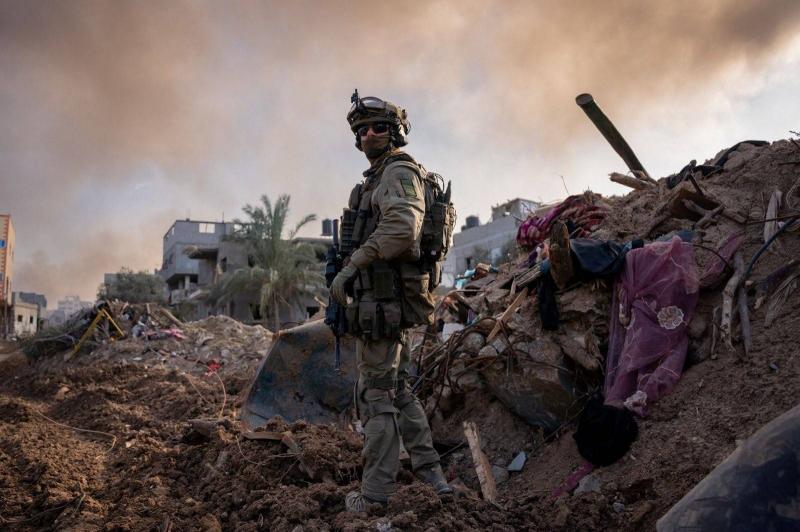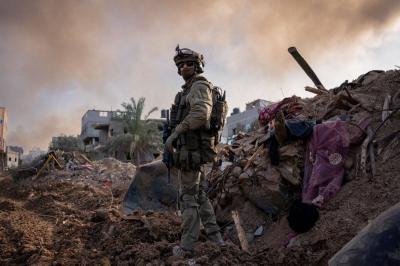As the war in Gaza enters its eleventh week, it has become clear that a long road lies ahead for Israelis before the army achieves its stated goal of destroying Hamas and bringing back more than 100 hostages to Israel. In the face of increasing international pressure to cease fighting and enhance aid flow to the Gaza Strip, Prime Minister Benjamin Netanyahu has spent days issuing video statements reaffirming his determination to succeed in the war. This week, he stated, "Anyone who thinks we will stop is disconnected from reality." His popularity has severely declined due to security failures that allowed thousands of Hamas militants to surge into southern Israel on October 7. However, a significant majority of Israelis support the military operation. Prominent researcher Tamar Herman from the Israeli Democracy Institute, a nonpartisan organization that regularly conducts surveys on public trends regarding the war, stated, "We are not witnessing a decline in support." She added, "The vast majority believes that the task must be accomplished. But what does that mean? No one knows exactly."
The shock felt by Israelis from the attack, which Israel claims resulted in the deaths of 1,200 and the capture of over 240 hostages, and the horror stirred by later reports of rape incidents have strengthened support for the war. However, the magnitude of the mission has become clearer as confrontations continue between Israeli forces and Hamas fighters through a network of tunnels and ambushes in debris-filled streets, leading to the deaths of at least 140 soldiers so far.
### Liberating from Illusion
Ben Caspit, a critic of Netanyahu and columnist for the left-leaning Maariv newspaper, wrote, "After seventy-five days of catastrophe, the time has come to liberate ourselves from the illusion." The masterminds behind the October 7 attack, Hamas political bureau chief in Gaza Yahya Sinwar and the military wing leader Mohammed Deif, remain at large. Israeli military officials indicate that completing the mission may require months. A survey conducted by the Israeli Democracy Institute revealed that 65% of Israelis believe that the government will destroy Hamas's capabilities as promised, but more than a third—29.4% and 5.6% respectively—think that achieving this is unlikely or stated that they do not know.
Hamas claims that the fate of the remaining 129 hostages hinges on ending the war first, while Israel will only accept a temporary ceasefire for increased humanitarian aid to Palestinian civilians. Yedioth Ahronoth writer Nahum Barnea, from Israel's best-selling daily, remarked, "Israel will feel bitterness, there is no doubt about that at this time."
### Ceasefire Calls
The killing of three hostages in northern Gaza by Israeli forces accidentally while waving a white flag came as a shock to the pro-military Israeli public. The survey indicated that most Israelis, 55.1% of participants, believe it is unlikely that all hostages will return home. Meanwhile, international calls for a cessation of hostilities have increased to the point that the United States, Israel's strongest ally, is pushing for a shift to more precise operations targeting Hamas leaders. According to Palestinian health officials, over 20,000 Palestinians have died in Gaza. United Nations agencies warn that the besieged strip is facing a humanitarian crisis that includes an escalating risk of famine. It remains unclear how long Israel can withstand these pressures. An Israeli official told reporters this week, "I truly cannot understand why the world is not encouraging us to move forward and accomplish our mission," rejecting calls to stop fighting and describing them as "the most hypocritical imaginable policy."
Previous wars in Gaza have ended with a ceasefire and Hamas declaring victory. Israeli officials assert that this should not be repeated and reference the defeat of ISIS, al-Qaeda, and Axis powers in World War II as precedents. Netanyahu-supporting Israel Hayom newspaper indicated this week that the signs suggesting Israel might offer concessions to bring more hostages home are "very concerning." Ariel Kahana wrote in his column, "Isn't it time to be resolute, break the cycle of bloodshed, and return to the principle that we do not surrender to terrorism but defeat it?"




